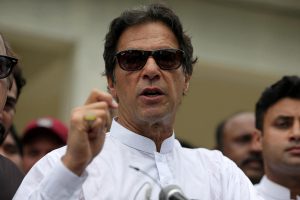The killing on October 24 of Arshad Sharif (49), a senior Pakistani journalist on the road between Magadi to Nairobi in Kenya has stirred a firestorm, with accusations swirling thick and fast that the Pakistani “deep state” may have marshalled the incident.
Unwilling to take the bait that the killing may have been the result of “mistaken identity” by the Kenyan police, observers say that the Pakistani establishment may have a glaring motive to eliminate Sharif.
Sharif was a top investigative journalist with Pakistan’s ARY television, which had been drumming support for Imran Khan. Sharif was also personally targeting the military in his broadcasts. His killing was therefore meant to sow fear among Pakistani media and the politicians not to mess with the “big boys” of the establishment spearheaded by the military.
In a well-argued article, the website The Geneva Daily cites several reasons as to why the official narrative from the Pakistani and the Kenyan side is flawed.
A statement released by the official Twitter handle of Kenya police claims that the officers of the General Service Unit (GSU) had mistakenly opened fire on the car in which Sharif was traveling. This was because a report had been lodged in the nearby Pangang police about a car theft.
Consequently, officers trailing the motor vehicle heading toward Magadi alerted the Magadi police, which had set up a road barrier. The Magadi unit opened fire when Sharif’s vehicle apparently did not stop at the barrier, leading to his death. Some Kenyan news sites said that a child had been kidnapped and was being ferried in the stolen vehicles.
A Kenyan journalist however, has picked some serious holes in the theory.
First, the stolen car KDH 700F, belonging to Douglas Wainaina in Pangani, was a Benz Sprinter.
It was unlikely that the police at the barrier would have opened fire at Sharif’s car which was a Toyota Land Cruiser, bearing the number plate KDG 200M. Besides, in case the Kenya police believed that Sharif’s car was ferrying a kidnapped child, it would have been illogical for the police to target the vehicle with heavy fire as it could have easily killed the abductee.
According to the Kenyan journalist, the car bearing 9 bullet marks had been hit from all directions. Besides, the majority of the bullets were fired on the side where Sharif was sitting, raising strong suspicions that the Pakistani journalist was a target of a planned assassination, rather than a victim of an accident.
The Geneva Daily report says that it seemed quite obvious that the shooting was not intended at stopping the vehicle but was more of an ambush, meant to kill whoever was in the car.
With the needle of suspicion on the Pakistani “deep state”, the report cites Nairobi’s governor Mike Sonko as saying that the Kenyan police should not be blamed for the death of the journalist. According to his claims, for the past few days, the journalist was being followed by a ‘Pakistani killer squad’ because of an investigation that he was doing to expose certain people in the current Pakistan establishment and the deep-state involved in a money-laundering syndicate. This syndicate allegedly also operates some car showrooms in Nairobi and Mombasa.
Arshad Sharif left Pakistan in August this year, following an FIR that was filed against him and ARY news, accusing him of making anti-state statements. Though Sharif had got a restrain order from the Islamabad High Court against the Federal Investigation agency and the police, he nevertheless fled Pakistan. But curiously, the ARY network fired him after he had left, apparently on flimsy grounds. This has triggered speculation that this decision by ARY was taken at the behest of the Pakistani government.
An open supporter of Imran Khan, Sharif had come into the limelight during the Panama papers exposé, which led to Nawaz Sharif’s disqualification. Besides, Sharif was also said to be working on a documentary film named ‘Behind closed doors’ which is expected to further expose the Sharif family’s various scams and corruption scandals, The Geneva Daily reported.
The report spotlights that the Kenyan police is under radar for extra-judicial killings. It points to an Al Jazeera’s investigative documentary called ‘Inside Kenya’s Death Squads’, in which people within the Kenyan Anti-Terrorism Police Unit (ATPU) confirm that cold-blooded assassinations are often carried out on government orders and sometimes, even for money.




















